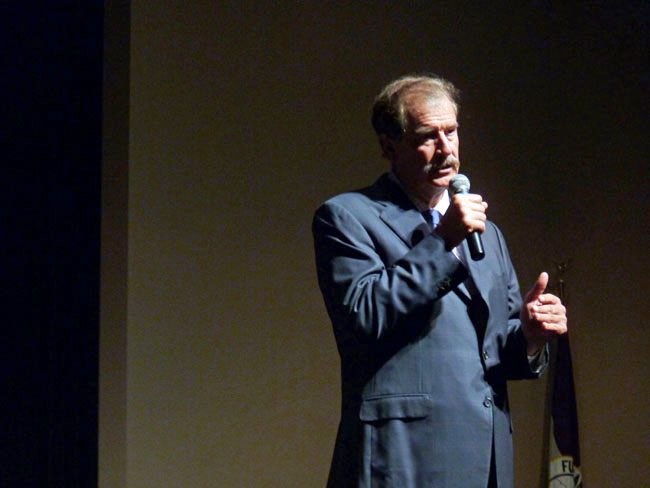Fox critical of U.S war on drugs

APRIL 19, 2012
by Sara Morano ’14, Contributing Writer
Standing six-foot-five, Vicente Fox has the distinction of being the tallest president in Mexican history.
Height, coupled with the booming baritone voice with which Fox alternated between English and Spanish, gave the former head of state a formidable stage presence that filled McAlister Auditorium last night when he spoke in front of a crowd of about 1,400.
Students in the Hispanic Organization of Learning and Awareness, College Democrats, College Republicans, The Cicero Society, FUSAB, SGA, Department of Political Science, and the Riley Institute worked together to arrange and fund the historic visit. It was the ex-president’s first to the state of South Carolina.
Junior Raul Rodriquez joined Furman president Rod Smolla, who in a rare moment, spoke Spanish to make introductions.
Promised was a lecture from one of the most “interesting and cosmopolitan” figures of “universal admiration,” and the hour-long event did not disappoint. It also didn’t shy away from controversial issues.
Just in introducing himself, Fox offered comment on the perennially contentious issue of migrant workers. He effectively used his personal history as a fifth-generation Mexican citizen whose grandfather came from Ohio to Guanajuato, “looking for the American dream in Mexico,” to characterize migration as a “two-way street.”
A large portion of his lecture was then devoted to commenting on America’s “War on Drugs.” According to Fox, these policies are an ineffective attempt to curb domestic consumption of drugs with adverse consequences for Mexico.
An astounding 50 billion U.S. dollars were cited as the size of the illegal drug trade each year that flows from South America to the United States and Canada by way of violent gangs and cartels.
Mexico, says its former president, produces less marijuana than is smoked in the state of California each year and consumes even less. It “doesn’t deserve” the violence and political disruption that happen when it is caught in the middle of the illegal flow. The “War on Drugs,” by focusing on the seizure of drugs within the United States and at the border, has done little to address the international nature of the problem.
Education and leadership were emphasized as broad goals capable of alleviating the problems Fox’s lecture candidly addressed. He emphasized “building bridges, not walls” and quoted Cicero in praising the rejuvenating spirit present at universities like Furman. The North American Free Trade Agreement (NAFTA) was also hailed as a specific tool for building these metaphorical bridges.
Questions for Fox on these positions showed that his words inspired initiative: “What can we do to help stem the violence, especially as it affects children, in Mexico?” They also sparked skepticism: “What is your response to widespread criticisms of NAFTA’s adverse impact on the natural environment and climate change?”
During a protracted Q-and-A, students, lining the aisles 5 and 10 deep, waited eagerly to pose questions to Fox long after the program’s end.